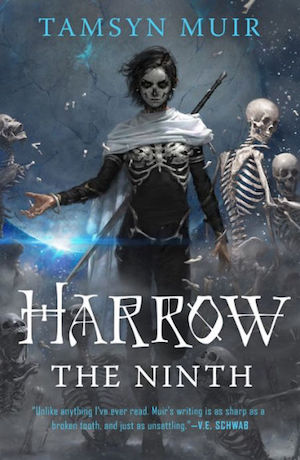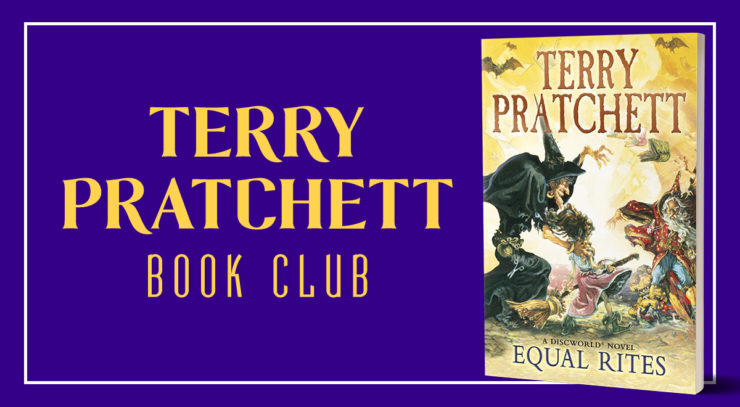All right, friends, here we go. It’s time to get talking about magic and gender and equality, and all that other good stuff. We’re about to get a lesson in Equal Rites.
Summary
A wizard named Drum Billet heads to a small village where an eighth son is about to be born to an eighth son, who is a blacksmith. (You know, the whole thing about the number eight being significant on the Disc.) Drum Billet is there because when a wizard dies, as he’s about to, they can pass on their power to a new wizard. Granny Weatherwax, the midwife, brings the baby down and before she can say anything, the smith follows Billet’s instructions and has the baby hold his wizard’s staff. Only it turns out that his baby is a girl. Drum Billet is already dead and taken away by Death. Granny Weatherwax tells the child’s father, Gordo Smith, that he should burn the wizard’s staff, but everything they try to do backfires. Gordo Smith insists that he’ll pile things around it and just leave it be. Time passes, and the little girl—named Eskarina—gets older, but doesn’t appear to show any signs of magic. Yet.
Buy the Book


Harrow the Ninth
Esk goes with her two brothers to visit Granny Weatherwax in the winter—she’s starting to have ideas about how magic works instinctively, and the staff is acting up at home. When they arrive at the witch’s house, they find her in bed and assume her to be dead (she is, in fact, currently borrowing the body of a crow). Esk agrees to stay with her while her brothers go to fetch someone, but the noises in the cottage scare her, and she runs out into the night. She ends up coming across a pack of wolves, while Granny wakes up in her own body and sets out after the girl. When she arrives she finds the staff protecting Esk from the pack of wolves, prods at her awkwardly (Granny doesn’t get children), and escorts her back to her cottage, where Esk’s father and brothers are surprised to find her alive. Granny says that Esk has had a fright and should stay the night. Once they’re inside, Esk asks why she won’t light the fire by magic, which Granny insists is not what magic is for. Though, in fact, it is one of the first things wizards learn to do.
Granny helps Esk get to sleep and then gets into the mind of an owl and flies to the tree that the girl spends her time around. (It used to be a wizard.) She tells the tree that the magic in Esk is starting to become a problem, and the tree says she should train the girl or take her to the Unseen University then. Granny is irate, but flies back home and gets back into her body, only to find the staff in her house. She tries to light it on fire again—this time Esk starts screaming. The next morning Granny asks Esk what she wants to be when she grows up, and the girl admits she doesn’t know, so Granny asks if she would like to learn witching. Esk says she would, which leads to Granny having a fight with her father about the difference between men and women’s magic, and how bad it was going to be for Esk if she couldn’t figure out how to navigate her ability.
Granny starts teaching Esk witchcraft, which is mostly lessons about herbs and potion-brewing and bees, but no actual magic. Then she shows Esk her pointed witches hat and explains headology—a witch’s real power comes from others knowing she’s a witch. She can convince people that what she does works because they believe in her and what she says. Eventually, Granny teaches Esk her first bit of magic, in Borrowing. They both enter an eagle’s mind, but when Granny tells Esk not to overdo it, the girl lets Granny go back to her body and flies away as the eagle, so Granny has to take the girl’s body home. A whole day passes, and she’s still gone. Esk is in the eagle’s mind and forgetting herself. Granny sends bee drones looking for Esk, but they can’t find her. Finally, she asks the staff to take her to Esk—which it does by having her board it like a broomstick. She finds the eagle, bags it in petticoats, and tells the staff to fly them home slowly.
Esk is too tangled with the eagle mind to make her way back. Granny accepts some of the staff’s power to give her the ability to untangle Esk’s mind, wakes up some time after the fact, then sets the bird outside. Esk wakes in a panic and Granny explains that she’s learned a lesson—that you can’t steal another’s body because different bodies cannot contain human minds; Esk didn’t take over the eagle, she became one. Granny sends the girl out to give the eagle some bacon, and when she return, the witch finally bequeaths the staff to her.
Book Club Chat
It’s just, with every book Pratchett ups the ante on how he’s going to play with language and sometimes it makes me so angry how good it is. Like this: “Mist curled between the houses and the wizard crossed a narrow bridge over the swollen stream and made his way to the village smithy, although the two facts had nothing to do with one another. The mist would have curled anyway: it was experienced mist and had got curling down to a fine art.” Like okay, fine, just call out the fact that this is how narrative works, talking about aspects of setting alongside the main action, and then acknowledge the fact that you’re doing it and poke fun at it, how dare you.
So. This book actually began with a talk that Pratchett gave on gender and magic (which you can incidentally access the text for here) in 1985. In addition, Esk was apparently based on his daughter, Rhianna. And in his conceit for the premise, outlined by this speech, he basically says that his belief in the difference between what is labeled “men’s magic” and “women’s magic” is not truly down to sexism and devaluing women’s labor and expertise, but in fact a bit more cerebral—he believes that wizards are about what people hope they could be if they had power, and witches are about what we fear we might become. Which, you know, it’s a totally valid way of looking at branches of magic and how we depict them in literature.
I do fundamentally disagree with Pratchett on this because I think that both of these things can be true rather than mutually exclusive. We can note that maybe wizards explore what it would be like to wield great magical influence and that witches explore the smaller, more intimate sides of magic, and acknowledge that there’s some sexism at work in how these things are often portrayed for us. And that’s important because critical theory is full of layers and nuance, and we should be mindful of the various ways we can view these things.
On the other side of this, there’s a sort of gentle ribbing going on around the subject of people who are actually practicing occultists, hedgewitches, and midwives, and Wiccans, and then the side that takes more stock in numerology and magic as a sort of complicated form of math. Personally, I give as much respect to those beliefs as I do to any sort of religion—people should believe what they like and not get persecuted for it. But as much as I adore Granny Weatherwax—and I truly do—the headology concept irks me deeply on a personal level because I have been subjected to a lot of “believe and you’ll heal” and useless herb-drinking in my life, and it has never helped me a bit. As a person with disabilities that often go invisible, with a mother who is an evangelist of “magical thinking”, this sort of thing rubs me very much in the wrong way. So for that part, I appreciate the fact that Pratchett doesn’t take it over-seriously.
Also, while there is no direct analog to be had, there is a vague tie here to The Sword in the Stone, with Granny teaching Esk via animals just as Merlin did with Wart. I can’t help but be pleased by the fact that Pratchett creates the same dynamic with two women, which is made more poignant in a book that is trying to highlight how men and women handle magic differently.
But there’s another question to be asked here when it comes to gender (and I will be using gender when I talk about these things rather than “sex” because though it wasn’t common parlance yet in the 80s when this was written, sex and gender are not the same): How does society influence gender and gendered thinking? Because it’s one thing to say “women’s magic does this” and “men’s magic does this”, but where does that thinking originate? As our read continues, we’ll be getting into that concept a whole lot more, I expect.
Asides and little thoughts:
- Keep thinking about the quote “It is the Great A’Tuin, one of the rare astrochelonians from a universe where thing are less as they are and more like people imagine them to be[…]” and it is simultaneously a beautiful statement and also maybe the greatest flex from an authorial standpoint that I’ve ever known.
- These books have an undeniably Western-Christian worldview given Pratchett’s own background, but I do appreciate the moment’s consideration given to reincarnation when Drum Billet is talking to Death, and how He tells the wizard that one needs training to do it, “AND WITH YOUR KARMA AN ANT IS TOO MUCH TO EXPECT.”
Pratchettisms:
Here it comes now. Watch closely, the special effects are quite expensive.
It doesn’t take a lot to interest goats.
She opened two eyes like angry diamonds and said, “I see. That’s the way of it, is it?”
The tree might as well have asked why fish couldn’t be birds.
“What’s an elephant?”
“A kind of badger,” said Granny. She hadn’t maintained forest-credibility for forty years by ever admitting ignorance.There would be a price. And Granny knew enough about wizardry to be certain that it would be a high one. But if you were worried about the price, then why were you in the shop?
Next week, we read to “It went on for a long time. It was one of the most unpleasant sounds Esk had ever heard.” See you then!










